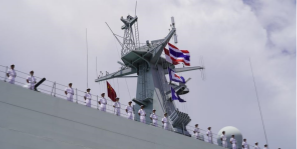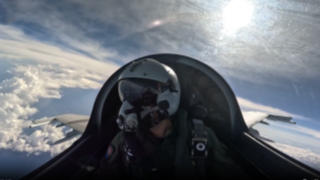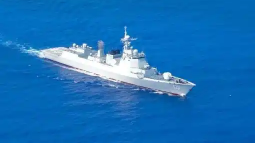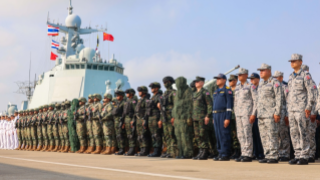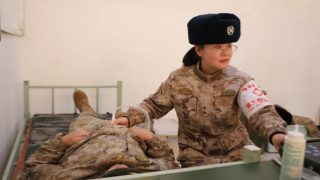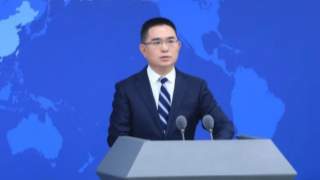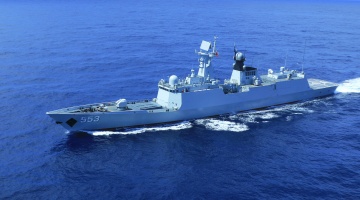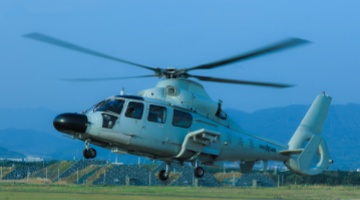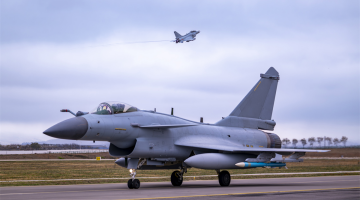On the morning of January 17, 2025, Senior Colonel Wu Qian, Director General of the Information Office of the Ministry of National Defense (MND) and Spokesperson for the MND, answered recent media queries concerning the military.
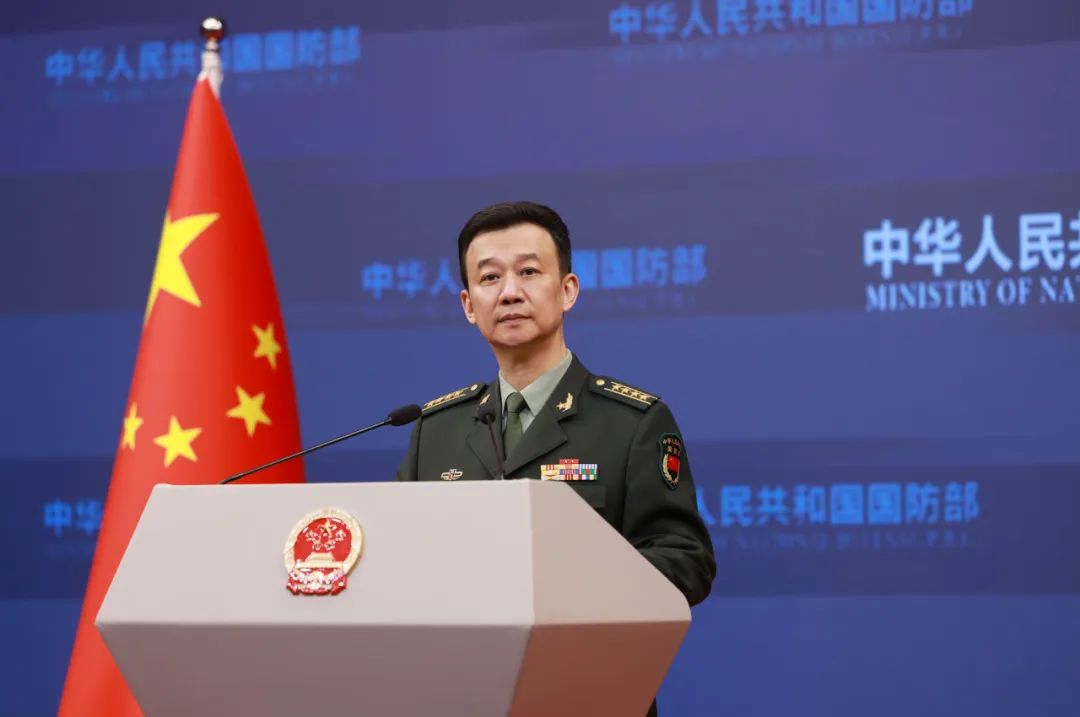
Senior Colonel Wu Qian, spokesperson for the Ministry of National Defense (MND) of the People's Republic of China (PRC), answers recent media queries concerning the military on January 17, 2025. (mod.gov.cn/Photo by Li Xiaowei)
(The following English text is for reference. In case of any divergence of interpretation, the Chinese text shall prevail.)
I have one piece of information at the top.
According to the cooperation plan between the Chinese and French militaries, General Wu Yanan, Commander of the PLA Southern Theatre Command and Rear Admiral Guillaume Pinget, Joint Commander of the French Armed Forces in the Asia-Pacific had a video phone call on the morning of January 17. They had an in-depth exchange of views on issues of common interest.
Question: After an earthquake struck the city of Rikaze in Xizang, President Xi Jinping made important instructions. The PLA and the PAP are actively involved in rescue and disaster relief efforts. Please share more information on it.
Wu Qian: On January 7, a 6.8-magnitude earthquake jolted Dingri County in the city of Rikaze in Xizang Autonomous Region and caused heavy casualties. President Xi Jinping attached great importance to the disaster relief work and gave important instructions. He emphasized that every effort be made to search for and rescue survivors, treat the injured, and minimize fatalities.
Military organs and troops at all levels resolutely implemented the important instructions of President Xi and the CMC, making all out efforts to protect the safety of people's lives and property and ensure social stability. The CMC Joint Operations Command Center promptly activated the emergency response mechanism and guided the PLA Western Theater Command and PAP troops to organize ground and air forces to effectively carry out rescue operations. As of January 15, the PLA and the PAP had all together deployed 2,055 service members and 869 militia personnel, 20 transport aircraft, helicopters, and unmanned aerial vehicles, as well as 297 sets of vehicles and engineering equipment. They have rescued 27 people, relocated 2,756 people, set up 21 field medical support stations, treated and provided medical service to 22,359 injured, constructed 2,812 tents or portable houses, provided more than 95,000 portions of hot meals, transported disaster relief supplies of over 4,300 tons, and cleared more than 4,700 cubic meters of debris.
When the people are affected by disasters, the military will come to their rescue. When the military and the people unite, there is no challenge we cannot overcome. The Tibetan for "Hello, PLA" echoing through the earthquake-stricken area reflects the profound bond between the military and the people. Standing together with the people in earthquake-stricken areas, the people's military put into practice the fundamental mission of serving the people wholeheartedly with concrete actions, and built an unbreakable great wall of steel to protect the people.
Question: Since the beginning of 2025, the PLA and the PAP have commenced their annual military training, making an all out effort to meet the military's centenary goal. Please provide more information about this.
Wu Qian: In 2025, military training will focus on responding to real security threats, enhance training under real combat scenarios, strengthen exercises on joint operations system, and fully leverage the deterring and conflict-preventing functions of military training. We will implement the arrangements made at the on-site meeting on basic training and the on-site meeting on combined training, conduct training in accordance with the new basic training outline, and address challenging issues by extensively conducting cross-service mixed formations training. We will give priority to training on new equipment such as new-type fighter jets, vessels and missiles, actively explore training in emerging fields such as unmanned systems and intelligent technologies, and create new growth points for combat capabilities. We will use more "technology+" and "cyber+" methods to solve training problems and advance innovations in technology-enhanced training. We will continue to carry out joint exercises and training with the armed forces of relevant countries and regions on more subjects, expand the scale of forces, increase joint training time, actively participate in international military sports competitions, and promote in-depth and practical training exchanges and cooperation between China and foreign countries.
Question: General Liu Zhenli, Chief of the Joint Staff Department of the CMC, led a delegation to visit Malaysia and Indonesia. Please brief us more on the bilateral military relations between China and these two countries.
Wu Qian: General Liu Zhenli, member of the CMC and Chief of the Joint Staff Department of the CMC, visited Malaysia and Indonesia from January 6 to 12. During the visit, the two sides exchanged views on issues of mutual interest, such as the relations between the two countries and militaries, and international and regional situation. The visit aimed at implementing the important consensus reached between the leaders of China and these two countries, enhance strategic communication, deepen cooperation, and elevate the mil-to-mil relationship to new heights.
Both Malaysia and Indonesia are friendly neighbors of China across the sea. Under the strategic guidance of President Xi Jinping and the leaders of these two countries, China-Malaysia and China-Indonesia relations have witnessed rapid and comprehensive growth, and started a new chapter of building a community with a shared future. As an important part of bilateral relationship, the mil-to-mil relations have also made positive progress. Sound exchanges and cooperation have been realized in high-level exchanges, joint training and exercises, maritime security, and multilateral coordination under the ASEAN framework. We stand ready to work together with the two militaries to further consolidate strategic mutual trust, strengthen personnel exchanges, extend substantive cooperation, jointly uphold international fairness and justice, work together to implement the Global Security Initiative (GSI) and make joint contributions to peace, stability and prosperity of the region and beyond.
Question: The first Type 076 amphibious assault ship PLANS Sichuan had its launching and commissioning ceremony recently in Shanghai, which received wide media coverage around the world. According to media of the Taiwan region, the ship has astonishing capabilities for three-dimensional landing operations, and the deployment of the ship would be the most dangerous moment for Taiwan. Some foreign news outlets also claimed that the ship will break regional balance of military power and bring unstable factors. What's your comment?
Wu Qian: It is a common practice for countries around the world to develop weapons and equipment in accordance with their national defense requirements. China's independent development and construction of the Type 076 amphibious assault ship is a normal arrangement consistent with China's national security needs and the overall development of the PLA Navy. The goal is to safeguard national sovereignty, security and development interests and better protect peace and stability in the region and beyond. The vessel is a new-type amphibious assault ship independently developed by China. It applies electromagnetic catapult and arresting technology, and can carry fixed-wing aircraft, helicopters and amphibious equipment. The ship has strong capabilities for amphibious and far-seas operations. After its launching, the ship will conduct equipment adjustments, mooring trials and sea trials.
China stays committed to the path of peaceful development and a defense policy that is defensive in nature. The launching of the ship is a normal arrangement in the development of the PLA Navy. It is not targeted at any specific entity, region or country.
Question: According to media reports, China's military exchanges with foreign countries witnessed solid progress with many highlights in the year 2024. Please brief us more information.
Wu Qian: In 2024, officers, soldiers and civilian personnel engaged in military diplomacy carried forward our fine traditions and made innovative efforts in our undertaking, and continued to improve the quality and efficiency of international military cooperation. First, shaping a favorable strategic environment. Staying in line with the directions set by head-of-state diplomacy, the Chinese military maintained close and practical military cooperation with Russia; progressively restored strategic communications and institutionalized dialogues with the US; deepened strategic communications with European countries, and engaged in exchanges with defense authorities and militaries from dozens of other countries. Second, safeguarding national sovereignty and security. We lodged diplomatic representations and released information in a timely way to respond to provocations and violations made by certain countries on the Taiwan question and the South China Sea issue, refuting the wrong words and deeds of relevant parties. Third, expanding multilateral diplomacy. As the host, the Chinese military successfully held the 11th Beijing Xiangshan Forum and the West Pacific Naval Symposium. We also actively participated in multilateral events like the Shangri-La Dialogue and the Defense Ministers' Meeting of the Shanghai Cooperation Organization to make our voice heard on multilateral stages. Fourth, deepening cooperation on joint training and exercises. For the first time, our troops participated in Exercise Peace Unity in Africa and Exercise Formosa in Brazil, which contributed to regional peace and stability. Fifth, fulfilling the responsibilities of a major country. China's Blue Helmets (peacekeepers) stayed on their combat posts in war zones; Channel 16 (of the PLAN vessel-protection task forces) remains a code for peace in the Gulf of Aden and waters off the coast of Somalia; the Ark Peace, the PLAN hospital ship provided medical services to people of 13 countries in Asia and Africa; and humanitarian demining courses were organized for Cambodia and Laos. The Chinese military has been taking concrete actions to deliver hope, warmth and strength.
In the new year, staff for military diplomacy will continuously act on Xi Jinping Thought on Strengthening the Military and Xi Jinping Thought on Diplomacy in promoting military diplomacy. We will uphold the concept of building a community with a shared future for mankind and go all out to achieve the centenary goal of the PLA.
Question: According to media reports, the Chinese military's oxygen supply support system for plateau units has achieved initial results in recent years, effectively meeting the oxygen needs of troops stationed at high altitudes. Please provide more information about this.
Wu Qian: President Xi and the CMC have always cared for the well-being and health of officers and soldiers stationed on the plateau regions, and have paid close attention to the issue of providing them with adequate oxygen supply. In recent years, we have developed a plateau oxygen supply support system covering large areas, establishing permanent storage points and a tiered distribution network. This system ensures that our troops on the plateau have access to oxygen during routine duties and can carry portable oxygen supplies during mobile operations. The transition from using oxygen solely for life-saving purposes to using it for improving health and conducting operations has significantly decreased the incidence of plateau-related diseases and acute altitude sickness among military personnel.
First, we have constructed more permanent oxygen production and supply stations, and equipped more oxygen generators to high-altitude units, making oxygen supply available at the soldiers' bedside. Second, mobile oxygen production facilities, like oxygen-generating cabins, have been deployed to mission areas, effectively overcoming the challenge of sustaining oxygen supply in remote locations. Third, portable individual oxygen supply devices have been issued to to troops, allowing for flexible utilization based on mission requirements. Fourth, we have intensified our efforts in technological innovation, initiating multiple projects for the development of new oxygen production and supply equipment.
It is cold in the border areas, yet the troops there are full of passion. For a long time, border defense troops stationed on the plateau have guarded the borders in extremely harsh conditions, making great sacrifices for the country and the people. Their dedication to the country will never be forgotten, and their well-being always tugs at the heartstrings of the people.
Question: It is reported that a naval vessel recently rescued a sick fisherman while performing a mission in the waters of Huangyan Dao. Could you please give us more details about it?
Wu Qian: Recently, a Chinese fisherman on Qiongqionghai 03003, who was fishing near Huangyan Dao, suddenly suffered from gastric bleeding. The replenishment ship Qinghaihu of the PLA Navy, which was operating in the vicinity, promptly responded and transferred the ailing fisherman aboard for initial medical treatment. It then navigated to waters east of Yongxing Dao, where a rescue helicopter from the Sansha Maritime Search and Rescue Sub-center airlifted the fisherman to the People’s Hospital of Sansha City for further treatment. The fisherman has now been discharged from the hospital and is in stable condition. The Chinese military will continue to protect the safety of the people's lives and property and contribute to peace and stability in the South China Sea.
Question: According to the "Taiwan Central News Agency", Lai Ching-te, leader of the Taiwan region recently said that countries like China and Russia threaten the rule-based international order and undermine peace and stability in the Indo-Pacific region and beyond. Therefore, Taiwan needs to continue to raise "defense budget" and enhance "defense capabilities." What's your comment?
Wu Qian: Lai Ching-te and his kind have betrayed their ancestors and what he said was far away from the truth. International documents including the Cairo Declaration and the Potsdam Proclamation have confirmed that the Taiwan region should be returned to China. Such fact is an important part of the post-WWII international order. The victory and outcome of the WWII must be respected and safeguarded. There is no other status of the Taiwan region in the international law than being a part of China.
The Lai Ching-te administration, in collusion with foreign forces, has been making constant provocations for "Taiwan independence". It is now the biggest source of chaos that undermines peace and stability across the Taiwan Strait and the Asia Pacific. We warn the Lai Ching-te administration and separatists for "Taiwan independence" that any attempt to seek independence by force is just like holding back the tide with a broom, and will eventually lead to self-destruction. Those seeking "Taiwan independence" will never have a good end. The PLA will spare no effort to fight separatism and promote national reunification. We have full confidence that the Taiwan region will return to the motherland and will have a better future after its return.
Wu Qian: The Chinese Spring Festival of the Year of the Snake is just around the corner. In Chinese tradition, the snake is a symbol of wisdom and vitality It also implies adapability and the conquering of the unyielding with the yielding. As families reunite to bid farewell to the past and embrace the future, I would like to extend warm New Year wishes to you all on behalf of my colleagues. Rest assured that the Chinese military will continue to stand by your side, offering warmth and protection. We will always be the sturdy support you can count on. May our country prosper and our people live in harmony.
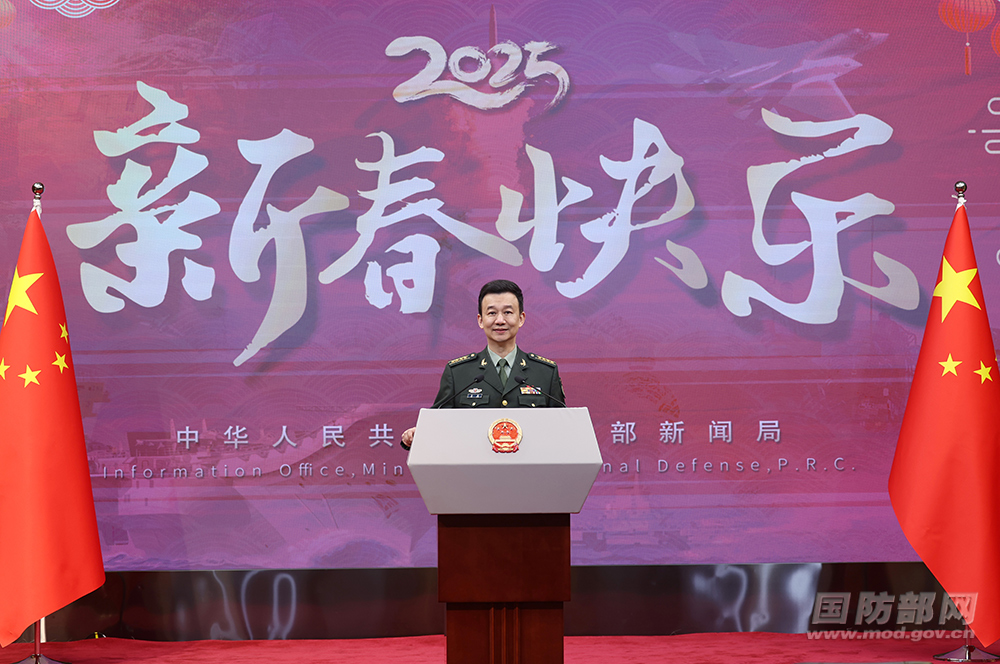
Senior Colonel Wu Qian, spokesperson for the Ministry of National Defense (MND) of the People's Republic of China (PRC), answers recent media queries concerning the military on January 17, 2025. (mod.gov.cn/Photo by Li Xiaowei)





